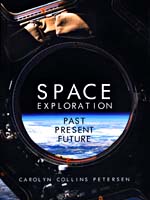Space Exploration
Past, Present, Future
It's a real challenge to tell the story of space exploration in 110,000 words...or even a half million words. Yet, that's the gauntlet Amberley Books laid in front of me when they contacted me to do this book. They wanted something that would appeal to readers who knew a little about space, but weren't necessarily space fans. It wasn't meant to be encyclopedic, but to give readers a good taste of what space exploration history is all about. On the other hand, they also suggested that it be something that even a space fan could read and recommend to others.
So, after a great deal of consideration about what avenue to take in bringing this fascinating story to readers, I decided the story I wanted to tell was about how our spacefaring culture was built. The more research I did, the more it became clear that space exploration isn't just a technological story. It relies on cultural shifts, education, legal decisions, commercial aspects, and even the arts.
Why Do It?
I've been asked, "Why do a book about space exploration? It's all been written about before."
This is true, but the past is prelude to the present and future. You have to cover some amount of history to see what direction you're headed. And, so, after I cover the Space Race, the Skylab and Shuttle eras, I moved into what's going on now. There's an incredible amount of work being done around the world by countries that, even a few decades ago, weren't pursuing space access.
Take India, for example. Today, it's a space power, with a probe at Mars and plans for ambitious future missions to the Moon and beyond. Just within the last year, New Zealand has begun launching rockets, and more than 75 countries have space agencies or institutes. One country, Luxembourg, is poised to become the world's asteroid mining center. And so it goes. Space access isn't relegated just to NASA, Russia, the European Space Agency, and China. The world has awakened to the possibility of space access for its citizens and companies.
Moving toward Commercialism
Commercial space is on the rise as companies like SpaceX and Blue Origins and Arianespace and others take the lead on launches. To be sure, they are contracting with NASA and others, but they have their own goals, too. The rise of free-standing space access has populated a movement called "NewSpace" that seems to thrive on its seeming independence from government efforts. Time will tell how successful NewSpace adherents will be.
Beyond Tech: The Connection between Space and Art
One of the things that fascinates me is the rise of space-related art, including digital paintings, space music, videos, and works in other media. Obviously, TV shows and movies take a cue from space — as any Star Wars or Star Trek fan will tell you. My partner is a composer of space music, and we've both spent considerable parts of our lives working in media used in planetarium theaters. It would be difficult to imagine them as existing if space exploration had never taken off.
Looking Ahead
What's next? Now, we face the future of space exploration that is vastly different from what we imagined it might be in the early 1970s. Solar system exploration is still a huge "thing", and the next steps are likely to be taken by humans who settle on Mars. Will it be within a decade? Longer? Who will do it? What comes after that? Can we ever go to the stars? Those are questions only the future can answer.
My job in the book was to raise them and try to answer them, and then leave the reader wanting to learn even more about this fascinating topic. For me, what's next is to update this book — it's always been a portrait of the past and provides a quick snapshot of the present and tantalizing glimpse of the future. Things are changing quickly in space exploration. New companes and countries are getting involved; the first generations of Marsnauts are in school right now, and the exploration of the solar system continues and will do so for some time to come. Future editions may well contain things we never thought about when I wrote the first edition. And, that's what makes doing such a book fun — seeing how things change. Stay tuned!



